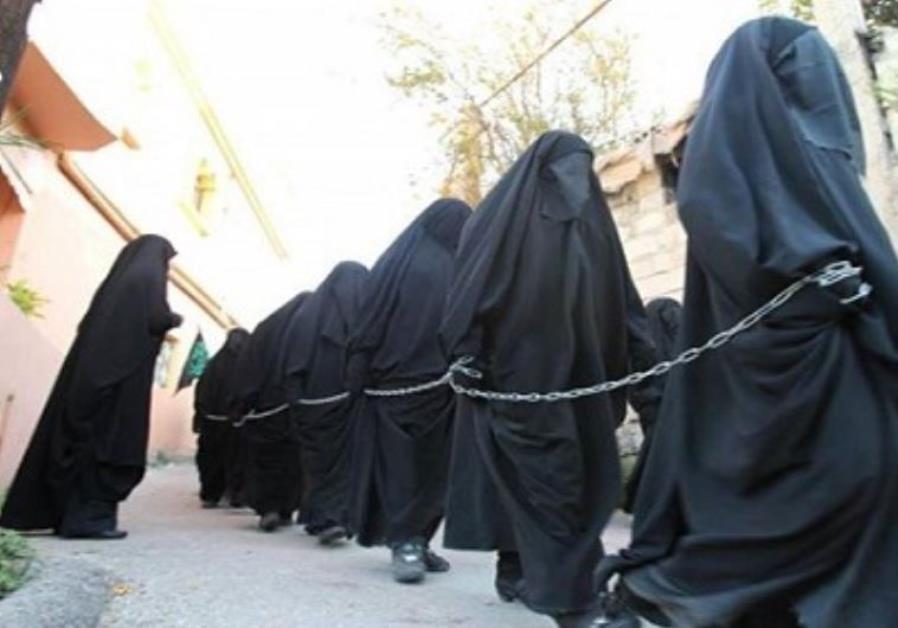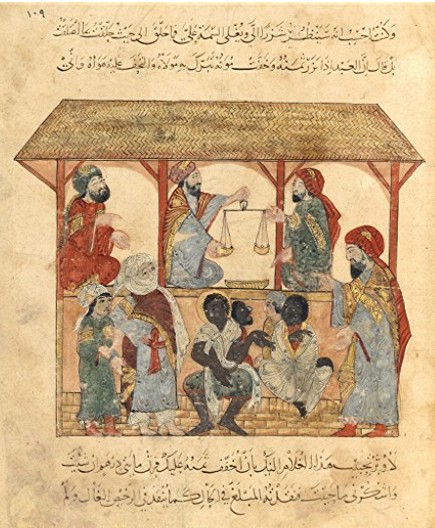
The Mauretanian Association for Human Rights’ burnt some books of Mālikī fiqh which they saw as extolling the virtue of servitude and calling for it to be continued in Mauretania.[1] This coincided with the transmission by the governmental Noble Qur’ān Broadcasting channel of a discussion by a Saudi faqīh in which, on air, he had said that those who wished to make an act of atonement by an act of manumission were permitted to purchase a slave from Mauritania at the price of 10,000 riyals.
IN AN ARTICLE on this subject some while ago I said that slavery was a practice that was prevalent throughout the world before the arrival of Islam, and that when Islam came – in conformity with the conditions of the age at the time – it did not explicitly prohibit it. It nevertheless encouraged and promoted the manumission of slaves on the basis of a fundamental religious concept founded upon the equality of all Muslims in Islamic belief.
I also said that Islamic society – like all societies in the world – practised slavery at times of raid and conquests and that Muslims held markets for the buying of slaves, and that the Sharīʻa established rules for how slaves should be treated and books on fiqh went into great detail on this subject.
I also maintained that it was impossible in our present age to apply the rulings of the Qur’ān in verses which speak of the slave and ‘what thy right arm possesses.’[2] One must therefore unveil oneself of enlightened religious independent reasoning (ijtihād) that bases itself on a reading of texts that promotes Islamic rulings that urged encouraged manumission in times past when it was impossible to annul the institution of slavery and the deeply rooted economic and social systems that were associated with it.
This ruling would say that conditions have altered and times have changed and that this has made it possible, and indeed obligatory, to annul what could not be annulled in the past, and that the aim of the faith is to protect human dignity and ensure complete equality between all men. It is therefore necessary to issue a ‘World Islamic Promulgation Annulling Slavery’.
I was unable to find a decisive, categorical ijtihād forbidding slavery
I mentioned then that – in my humble independent reasoning – I was unable to find a decisive, categorical ijtihād forbidding slavery in any of the four schools of law. All that there was in this regard was a general hadith on Islam’s insistence on manumission, on putting pressure on the sources of slaves, or on ensuring that they are properly treated. I also found comments arguing that one should keep silent on this matter since slavery no longer existed in the world today, and indeed some went even further that this, saying that the rulings specific to slavery should not be annulled since human societies may in the future re-adopt the practice!
Within five weeks of the publication of my above-mentioned essay we were surprised by an Egyptian preacher named ‘Abd al-Ra’ūf ‘Awn who contracted marriage with a women based on ‘what thy right arm possesses’. It caused an uproar among some shaykhs – which to this day has not abated – who accused him of degeneracy, anti-Islamic hostility and of contravening the Sharīʻa.
Dr ‘Abd Allāh al-Najjār, Professor of Comparative Law, member of the Islamic Research Academy at Al-Azhar, and member of the International Academy of Islamic law in Jedda, commenting on this marriage saying that it was:
a form of tampering with Muslim honour since the basic rule is one of prohibition. God made honour sacrosanct and allowed it to be infringed only in ways set down in His Book and in the Sunna of His Prophet as determined by Muslim scholars throughout the ages.
He went on to say:
There is, now, no ‘what thy right arm possesses,’ for it has come to an end. The one who said to the Shaykh “I have enslaved myself to you” should repent to God, just as the Shaykh should repent to God, for she does not own herself in such a way as to enslave herself to him, since mankind is free and is not under the possession of someone else. This is one of the cornerstones of Islamic law. When the Prophet saw an infringement of custom concerning marriage and divorce and witnessed a man divorcing his wife with a single word, he said: “does he play with God’s Book while I am among you?”
Dr al-Najjār said that the meaning of ‘what thy right arm possesses’ is that the maidservant is to be the property of someone. But slavery does not exist now. This is a free woman while the enslavement of a woman means that the children born of her will bear her status of slavery. That is, she will give birth to slaves and create generations of humiliated folk.

Suggested Reading
The steps taken by ‘Awn – and which we oppose – highlight the dilemma that besets a mindset that understands texts literally and does not believe in a reading of the verses of the Qur’ān according to the historical and social contexts of their revelation. It is unable to present an ijtihād inspired by the spirit of these verses and fulfil the comprehensive intentions of the Sharīʻa.
When Dr. Al-Najjār crossed swords with the preacher ‘Awn in the television programme The Truth on the Dream Channel, and said that slavery was no longer existent in the world today, and that servitude had come to an end, ‘Awn’s reply to him was that Islam had not prohibited slavery, that the only ones who had prohibited slavery were the United Nations and he challenged him to find evidence in the Qur’ān or the Sunna for the prohibition of slavery.
There is no Qur’ānic text categorically prohibiting slavery
It is true that the preacher ‘Awn is correct – according to the school of thought that he follows – in saying that there is no Qur’ānic text categorically prohibiting slavery and ‘what thy right arm possesses’. The reference to ‘what thy right arm possesses’ occurs in 14 Qur’ānic verses in the chapters al-Nisā’, al-Nahl, al-Mu’minūn, al-Maʽārij, al-Nūr, al-Rūm and al-Ahzāb, andnone ofthese verses consider slavery forbidden.[3]
The silence of the shaykhs, the fuqahā’ and those who call themselves scholars on the matter of condemning slavery and their inability to exercise independent reasoning in prohibiting it conclusively and categorically is what is leading to opacity in dealing with this file in its entirety. Some Wahhābi shaykhs, for example, issue fatwas dealing with ‘what thy right arm possesses’ as if it were an issue relevant today,[4] and the jurisprudence on slavery still exists in school and university syllabuses.
In justifying his slavery marriage ‘Awn maintains that the marriage is licit, trouble-free and does not incur financial burdens law necessitate going to a ma’dhūn[5], but is instead based on trust between the two parties, and that it also legally allows a woman not to wear the hijab.[6] He went on to say:
I found that it was permissible in Islam for a slave woman to uncover her hair and wear a skirt down to the knee and half length garments in the street. This is not prohibited for her. There is a sound hadith of the messenger that states that “the pudendum [i.e. area to be covered] of a man at prayer is that which is between his navel and his knee, and the pudendum of a maidservant is as the pudendum of a man”. Therefore the pudendum of the maidservant is equivalent to that of the man, as God above the seven heavens stated.
And further:
A significant number of Muslim girls are unable to wear the hijab and are not content to do so. So the idea occurs to me that for as long as God has given permission for this to the slave woman, it is possible for her go about with her hair uncovered and not don what we recognised as the hijab, given that she has a hijab that is specific to her – that is the concealing of that which lies between the navel and the knee. ‘Umar ibn al-Khattāb and walk in the street and if he found a slave woman covered and wearing a hijab he would take it off her. Anas ibn Mālik used to say: “Umar’s slave women used to serve us whilst their hair hung loose to their breasts.”
The gross error in the preacher ’Awn’s discourse – if we assume that he made this with good intentions – is that he is attempting to find solutions for basic questions, such as the financial expense of marriage and women wearing the hijab. But he does so by committing an ethical crime that is greater and more dangerous: the enslavement of women and the robbing her of her humanity. For all the hadith and the verses which he adduced to justify his claim were codified for the purpose of establishing how to deal with slaves in a society where slavery was a permitted and accepted practice. The moral contradiction which the preacher ‘Awn is falling into is principally caused by a methodology of literal reading of the texts.
The fiqh on slavery still exists in school and university syllabuses
The Mufti of Egypt Dr ‘Alī Gom’a describes the manager of a slave woman as:
a fabrication against Islam, and active ignorance by the ignorant and of hostility by enemies; ‘what thy right arm possesses’ does not exist since slavery has come to an end and is no more.
These words of the Mufti highlight the opacity of the position taken by the shaykhs of the various Islamic denominations which we mentioned earlier, and which contents itself with the negative position that it adopts: ‘slavery has come to an end and is no more’. It does not, however, take the decisive positive step towards a contemporary ijtihād to the effect that Islam ‘prohibits’ slavery. Such a measure, as we said before, calls for a courageous ijtihād in the reading of texts, the verses on slavery and ‘what thy right arm possesses’, one that takes into account changing conditions and differing times and understands the balance of interests and embraces the comprehensive purposes of the Sharīʻa, in the way that the Orthodox Caliph ‘Umar ibn al-Khattāb engaged in his independent reasoning in the affair of ‘those whose hearts are to be reconciled’[7] and his refusal to apportion the rural areas of Iraq as spoils of war.
[1] Mauritania passed a law in 2007 that actually criminalizes the act of owning another person, but so far only one case of slavery has been successfully prosecuted. According to U.N. estimates, from 10% to 20% of the 3.4 million-strong population of that country still lives under slavery conditions, while many others live in conditions of semi-slavery. (Ed.)
[2] Mā malakat aymānukum (or similar constructions), is a phrase that occurs in 14 verses in the Qur’ān (see author’s note below). There are other verses (such as Qur’ān XC,12-13] where other terms denoting slaves are used.
[3] The verses are: IV 3,24,25,36; XVI 71; XXIII 6; LXX 30; XXIV 32,33,58; XXX 28; XXXIII 50,55.
[4] In 2003 a high-level Saudi jurist, Shaykh Saleh Al-Fawzan, issued a fatwa claiming “Slavery is a part of Islam. Slavery is part of jihad, and jihad will remain as long there is Islam.” He attacked Muslim scholars who said otherwise maintaining, “They are ignorant, not scholars … They are merely writers. Whoever says such things is an infidel.” (Ed.)
[5] The official authorised to perform civil marriages.
[6] The argument here is that the hijab, historically, was for free women only and was forbidden to servants and slaves to wear.
[7] ‘Umar is said to have abrogated a passage in the Qur’ān: The alms are only for the poor and the needy, and those who collect them, and those whose hearts are to be reconciled [Qur’ān IX,60], that is, payments from the spoils of war earmarked as a strategic encouragement for those whose Islam was weak or non-existent. The affair is still contentious. Cf. a typical discussion on this here. (Ed.)


